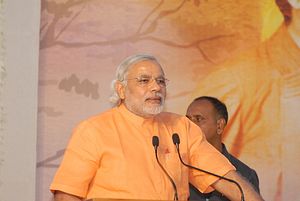As others have reported today, the Bharatiya Janata Party (BJP) won a landslide victory in India’s parliamentary elections this month. It’s the first time that a single party has won a clear majority in an Indian election in three decades.
The BJP’s victory will bring Narendra Modi to power as India’s next prime minister. As Ankit and I talk about on the podcast today, Modi and the BJP’s victory are in many ways a nightmare for Pakistan. The BJP is a Hindu nationalist party, and both Modi and the BJP have been perceived as being especially hardline when it comes to Pakistan.
Ankit, for instance, pointed out that Modi has suggested that India might conduct covert cross-border raids targeting specific Pakistan-based anti-India terrorists. Another harrowing possibility is that Pakistan-based terrorists, at least assumed to be working in cohort with Pakistani terrorists, will carry out another major terrorist attack in India in the mold of the 2001 bombing of the Indian Parliament building or the siege of Mumbai in 2008. A BJP government under Modi is unlikely to act with the same restraint that the outgoing UPA government has shown in these incidents.
Even if incidents as dramatic as these don’t materialize, Modi and the BJP’s victory could put the brakes on the nascent Indo-Pakistani détente. As The Diplomat has reported, since Nawaz Sharif’s assumption of power in Pakistan in 2013, India and Pakistan have made small but notable progress in expanding trade and people-to-people ties. It’s possible that Modi will reverse course on this front, which is probably one reason Sharif has been so quick to reach out to Modi and congratulate him on his victory.
Although none of these possibilities should be dismissed, it’s possible that Modi will actually become an asset for Pakistan on a couple of fronts.
First, the BJP in general and Modi in particular have been widely criticized as being anti-Muslim. Most notably, many believe Modi either acquiesced in or actively encouraged the anti-Muslim riots in Gujarat back in 2002. At the very least, Muslims in India are extremely wary of Modi and the BJP at present. If actions and rhetoric in the ensuing months and years confirm their current suspicions, Indian Muslims and other non-Hindu Indians are likely to become extremely dissatisfied.
Moreover, if the Indian government enacts egregious anti-Muslim policies, or condones anti-Muslim actions (especially something like the Gujarat riots in 2002), this will hurt India’s image in the international community, particularly among Western nations like the U.S. and Muslim nations in the Middle East. Pakistan will have opportunities to exploit this dissatisfaction among Indian Muslims, although it will have to tread carefully so as not to provoke Delhi into a kinetic conflict. At the same time, it will benefit from India’s image suffering in the court of international opinion.
Second, Modi’s premiership might push China even closer to Pakistan. As Ankit discussed on the podcast today, it’s not clear that Modi will take a hard line against China, especially given the importance he places on economic growth. Still, if history is any guide a BJP prime minister is likely to see China with greater alarm than a Congress Party leader. And if India adopts more hardline policies towards China, Pakistan becomes a bigger asset in the eyes of Beijing. This would be extremely beneficial to Islamabad, given its desperate need for Chinese assistance and aid in numerous areas, especially as the U.S. is likely to reduce its own aid to Pakistan as it withdraws from Afghanistan.
Thus, while on the surface Modi’s electoral victory is unsettling to Pakistan, it may ultimately work out in its favor.

































